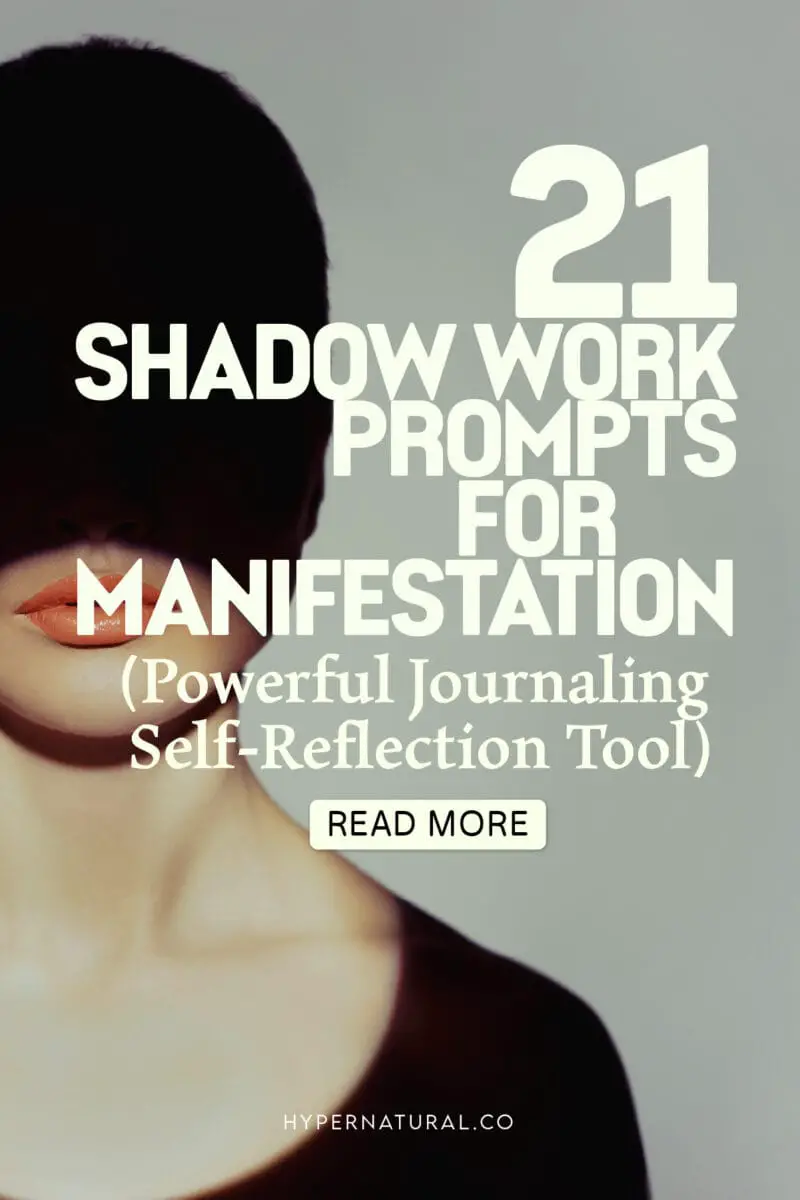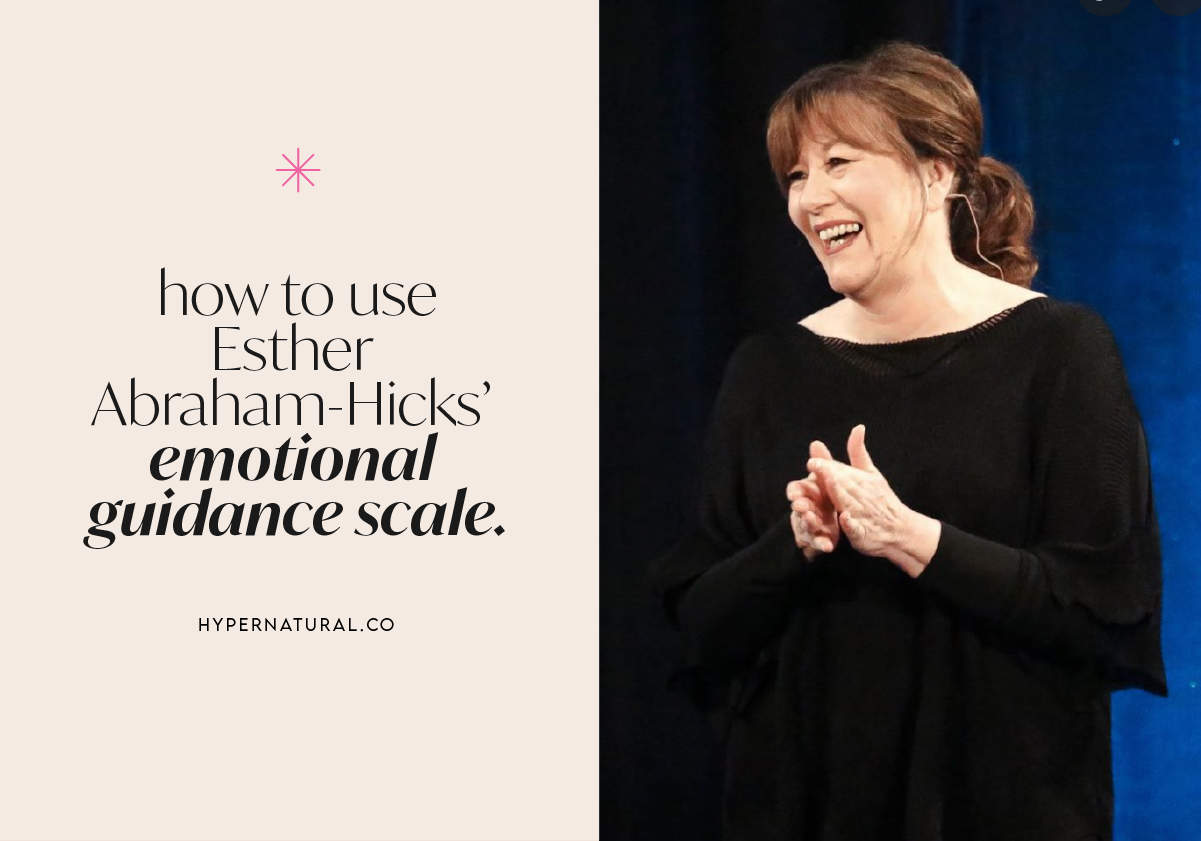Does shadow work scare you a little?
People tend to shy away from doing shadow work because the word “shadow” sounds dark and eerie.
However, facing your shadow is quite the opposite; facing your shadow will ultimately free you.
Doing shadow work is similar to standing at the edge of an indoor pool on a freezing day and feeling afraid to jump in because the water is dangerously cold. But deep down, you know you’re safe because once you take the leap and plunge in, your body temperature will eventually regulate and balance out.
Because it has to.
So, let’s learn about shadow work and how it can enhance your manifesting journey, shall we? Also, there will be 21 shadow work journal prompts for manifestation to get you started.

What is Shadow Work?
Shadow work is a psychological and spiritual process that explores the unconscious mind. This process delves into the psyche’s hidden, disowned, and repressed parts. It allows us to shine a light on aspects that are not in our conscious awareness.
Our shadow is any part of the self that we condemn, judge, criticize, fear, deny, suppress, reject, or abandon. The purpose of shadow work is to integrate and unify our unconscious mind with our conscious mind to heal and become whole.
Carl Jung and Shadow Work
Legendary Swiss psychologist Carl Jung coined the term “shadow.”
He discovered that as the ego develops throughout childhood, the psyche splits and fragments, creating a conscious personality and the personal unconscious, aka shadow. Together, they make two parts of a whole.
I’d rather be whole than good. ~ Carl Jung
The unconscious is the deepest part of your psyche, where you store forgotten memories, repressed traumas, and primal urges that can influence your behavior. It is out of your awareness until you begin therapeutic work with a trained professional or do deep introspection and inner work, like shadow work.
The conscious self is who you know and believe you are; it is the parts of you that you are aware of. You can also consider it your idealized self or the person you strive to be.
As our egos develop in childhood, we absorb and make sense of the world around us. We learn dualistic concepts like good and bad, light and dark, love and fear, I like it, and I don’t like it, and so forth. We also begin to judge and discern what we consider right or wrong.
What we reject in ourselves becomes unconscious, creating a shadow. What each individual learns to deny and suppress varies depending on their environment, upbringing, and caregivers.
Over one’s lifetime, the conscious personality and the shadow can compete, causing inner conflict and sometimes turmoil. For instance, what we believe we should be versus what we want. The two sides will wrestle with each other until we heal, own, and integrate the fragmented parts of ourselves.
A Common Misconception of Shadow Work

A common misconception of shadow work is that upon hearing the word “shadow,” we tend to label the shadow as bad. We might think of it as the part of us that holds dark, nefarious fantasies, malicious thoughts, and emotions such as greed, envy, shame, or deep resentment.
The above is all true. However, your shadow also contains hidden gems, untapped gifts, and answers to life-long questions. Your highest potential can lay dormant in your shadow.
So don’t be scared of your shadow. Don’t think of it as bad, but think of it as a part of you that you reject, deny, or have forgotten to care for.
Shadow Examples:
Nancy grew up in a family that idealized humility. Maybe her parents didn’t intend to create a shadow for Nancy and were operating from a well-meaning place, but somehow, Nancy internalized that confidence in oneself is bad.
To be a good girl, she learned that meekness, keeping herself small, low confidence, and self-deprecating behavior gained her love and approval. She rejected feeling good about her abilities.
She unknowingly carried on in her adult life playing the “humble and I’m not smart” role (lack masked as humility) to please her family and not upset the status quo, thus playing this same role in society.
But Nancy’s deepest dream is to start an entrepreneurial venture. This dream would require her to feel good about herself and have healthy self-esteem and confidence.
The two sides of her “humility” and “confidence” can compete and create inner conflict until she integrates the two, leading to a healthy sense of confidence that will allow her to create her business and live a more fulfilled life.
On the flip side, Dan learned that he could only be strong and confident. He learned that vulnerability and crying were weak and not acceptable.
Dan learned to deny his vulnerabilities, thus disowning his whole emotional system. This example shows how disowning his emotions could cause complications in his romantic life and interpersonal relationships.
The list can go on about how the psyche can split and fragment. But you get the gist.
General Questions That Get Addressed When Working With the Shadow
The general questions here are directed at ourselves, i.e., What do I judge in myself? Another way to find your shadow is what you judge or dislike in others and what triggers you about others. In all cases, the remedy for your shadow is love, compassion, acceptance, and forgiveness.
- What do I judge?
- What do I dislike?
- What do I avoid?
- What do I disown?
- What do I abandon?
- What do I reject?
- What do I suppress?
- What are my fears?
- What are my insecurities?
- What am I ashamed of?
- What are my triggers?
What are Journal Prompts?

Journal prompts are a set of questions that help with self-reflection and introspection. Journal prompts can target any area of life, from general self-discovery to understanding beliefs around money or processing anger and resentment in romantic relationships. Of course, today, we’ll be focusing on shadow work for manifestation.
The purpose of self-reflection is to slow down and get to know yourself at a deep level. Journaling is a therapeutic process that allows you to connect with your inner life, dig deep into your psyche, and get honest with yourself. You can use the knowledge you’ve uncovered and turn it into wisdom to better your life and make any necessary changes.
Why Should You Do Shadow Work Journal Prompts for Manifestation?
The foundation of manifesting is the present moment. When manifesting, we want to free our vibration of past hurts, failures, and traumas to bring our desired future, free of worry and fear, into the present moment. This is living in the state of the wish fulfilled.
Often, what holds people back from manifesting their desires is their past: what they believe they are and what they believe is possible for them because of their past experiences and pain. So if you find that something is limiting or blocking you, or unwanted cycles keep repeating, then dedicating time to do shadow work is highly beneficial!
The primary purpose is to uncover deeply ingrained limiting beliefs and bring them to your awareness so that you can heal and dissolve them. Once you dissolve them, your vibration will rise in the process, helping you become freer, happier, healthier, and ultimately whole. It’s beautiful work!
Tips on How to Do Shadow Work Journal Prompts

1. Find Quiet Time Alone
I suggest scheduling about two hours to answer the questions. You can break the questions into three sets of seven and do it over three days.
I like to schedule these sessions when I spend quality self-care time alone or on an artist date. Make sure you intentionally slow down so your energy is relaxed and contemplative. Some questions may hit an old childhood wound or be something that’s been out of sight for a while, so take it slowly and be gentle with yourself.
2. Go Toward the Fear
Feel free to eliminate any journal prompt questions that do not pertain to you and go about the questions in a way that suits you.
However, if a question triggers you, this is a big clue to go toward the fear and answer the question. Fear, anger, or anxiety indicate that something about the question triggers you.
For instance, if you judge the question, get defensive, and feel the need to protect yourself. Or you feel that you want to avoid the question and run away. Pay attention.
If you need to, then save the question for another day. Take your time. When you are ready, gently push yourself to go towards the fear and go back to answer the question.
3. Get Honest
Get really honest with yourself. That means don’t bullshit yourself; I don’t mean to be brutal or bully yourself. I mean, get intimate, transparent, and honest.
Our shadow comingled with our conscious mind sometimes likes to mold, bend, deflect, and manipulate our story. In other words, it likes to make excuses. It may minimize or even catastrophize to avoid the truth. It helps us take the edge off a little and relieve stress.
Honesty is that little voice inside of us that sometimes we’re afraid to address and acknowledge, so we blaze through and ignore it. But when we acknowledge something, we can begin to explore and get curious about what bothers us or what doesn’t feel right. So that we can heal, integrate, or find solutions.
4. Don’t Judge or Criticize Yourself
Judgment and criticism block the flow of understanding. When you belittle or are hard on yourself, notice how the energy builds a wall and keeps you stuck.
Being harsh on yourself never solves the problem. Trust me, I learned this the hard way. If you tend to do this, shift your lens to problem-solving mode and search for solutions. Let whatever arises be there, understand it for what it is, and extract the lesson and message underneath your feelings.
5. Sit With Your Feelings
Sitting with your feelings is a dethawing process, like dethawing a piece of frozen meat. Some shadow work questions are heavy hitters that might feel distressing and make you feel bad about yourself. But don’t shy away. Let your subconscious wounds, memories, and beliefs reveal themselves.
Sit with your feelings, and acknowledge and understand them for what they are. Your feelings are always valid and right for you. As you own and care for your feelings, parts of you will integrate, and healing will naturally occur, helping the frozen piece of meat become warm, supple, and glowing.
6. Dig Deeper
Digging deeper will help you get to the root of any qualm or problem. Similar to the First Principles of thinking in science. Emotions are messengers. They either tell you that something is off or something is going well.
Not all questions will require this, but if needed, always go one layer deeper until you cannot go any further. When you have an answer to a question, ask yourself why or what this means and keep going until you reach the core. I’ve illustrated how to do this in the first question below.
7. Be Gentle and Kind With Your Shadow
The purpose of shadow work is to bring awareness, heal, and become whole. So the work is about love! Forgive, accept, and show compassion to your shadow. It is a must!
We all make mistakes, fall short, and experience negative emotions such as envy or jealousy. The truth is, we’re all probably not as good or bad as we think we are.
Our shortcomings, flaws, and deeply held resentments toward others are painful to acknowledge, but you are strong and loving. Remember, love is your true nature. And you have so much love in you to light up the Universe, let alone light up your life.
Related: 44 Affirmations for Inner Peace, Calm, and Well-being
8. Take a Bath or Do Something Relaxing Afterward
Facing yourself takes courage, so don’t minimize your efforts in answering these deeply-hitting shadow work journal prompt questions.
Over the years, when I started doing inner work, I didn’t understand what I was doing. I wasn’t feeling well for years. I was trying to understand and help myself. I began with psychotherapy sessions and was obsessive and diligent.
In retrospect, the years of hard work added up and paid off, and I feel freer than ever. I’m so happy I listened to my instincts and sought help because, let me tell you, people were judging me, and I doubted myself. I’m trying to say stay on course because shadow work pays off!
So, treat shadow work as a self-care day. I know that a person who cares about integrating their shadow is working on themselves and, in this act alone, caring about others. So, I applaud you. Treat yourself to the pleasures life offers and do whatever else you enjoy afterward.
Related: 13 Stress-Reducing Rituals to Feel Calm, Relax, and Be in the Moment
21 Shadow Work Prompts for Manifestation

1. What do you fear would happen if your dreams were to come true? Sit and imagine having your goal and see what comes up.
[Example: I want a dream partner who loves me.
Answer: I’m afraid I won’t be able to meet their expectations. The limiting belief is “I’m not good enough.”
Dig deeper.
What would he or she expect of me? This is really our own consciousness projecting onto other people.
The question then becomes, what expectations do I place on myself before I believe I can attract my dream partner?]
Next, make a list of fears. Then ask yourself, is it really true?
2. Do you believe in and value yourself? If yes or no, why?
3. Do you believe you are worthy of your goals, dreams, and desires? If so, why or why not?
4. Are there ways that you keep yourself small? If so, why and how?
5. Do you allow yourself to have what you want and desire?
6. How does your goal make you feel? (e.g., not good enough, empowered, etc.) Why don’t you already have your desire?
7. What do you think is blocking you from your desire?
8. What are your worries and frustrations surrounding your goal? Make a list.
9. What is your self-concept (collection of beliefs) surrounding your desire?
10. What parts of yourself do you condemn? Are there any parts in you that you need to forgive and show compassion towards?
[Example: Let’s say you’re manifesting money; in the past, you’ve gotten into trouble with money by going into debt multiple times. You’re not proud of your history and still condemn yourself.]
11. Are you holding onto any past resentments you would like to release? Make a list.
12. Do you feel stuck or stagnant? What is keeping you stuck or stagnant?
13. Are there ways that you self-sabotage yourself or self-destruct? If so, make a list of how you do this.
14. Make a list of traits that your parents or caretakers judged.
15. What traits do you not like about yourself? Make a list.
16. How do you cope with failure and stress? List 3 healthy ways to cope with stress, setbacks, and obstacles.
17. Are there situations where you’re not being authentic and honoring yourself just to be liked? If so, make a list.
18. Do you envy other people’s success? If so, what is it that they have that you want for yourself?
19. How do you want to be perceived? And what happens if others don’t perceive you the way you want?
20. What habits do you have that are not serving your long-term fulfillment that you would like to release?
21. Do you have a void, a feeling that something is missing that you cover up with addictions such as alcohol, obsessive eating, social media scrolling, etc.? What do you think that is?
Closing Thoughts on Shadow Work Journal Prompts for Manifestation
And voila! You’ve just learned the A to Z of doing shadow work. I hope these shadow work journal prompts for manifestation bring you closer to your manifestations. Remember, shadow work is about love, acceptance, forgiveness, and compassion. So, take it easy on yourself and enjoy the process.
You might also enjoy: Law of Attraction: Beginner’s Manifestation Guide
If you liked the article, please consider sharing it on Pinterest and connecting with us on social media. Happy manifesting.





